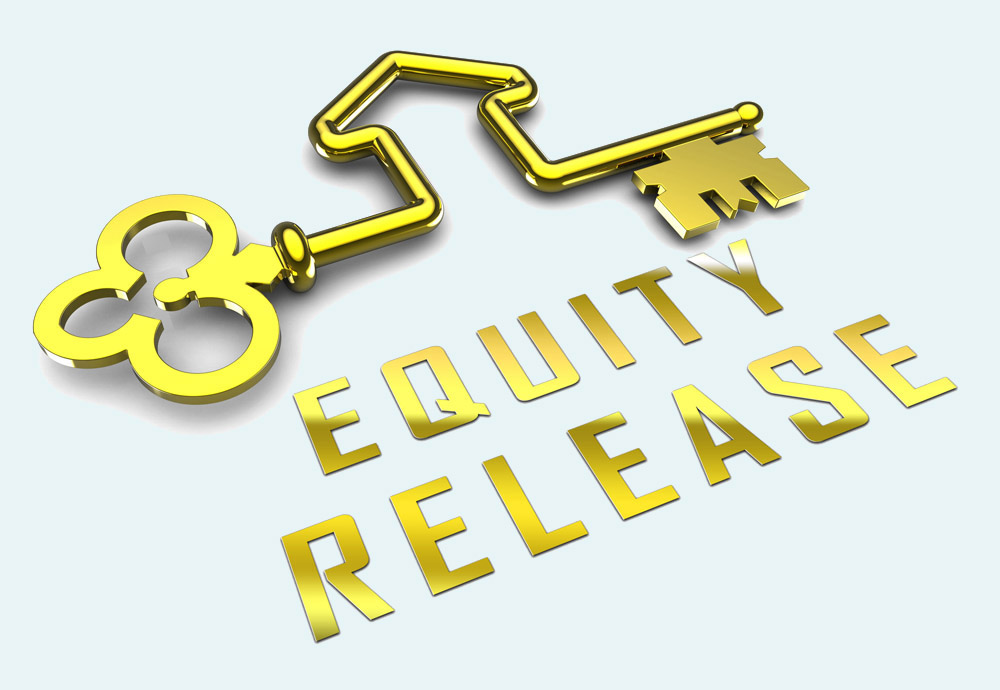We offer help and advice across an extensive range of regulated equity release plans, plus we provide full, pro-active customer support throughout the process of you obtaining your money. This starts with an initial free quotation and continues right through to the funds being paid either directly into your chosen account or via a cheque.
It is very important not to rush into any financial product, so put the kettle on, grab a cuppa then read on to find out: how to release equity, what you can spend the money on and whether it is taxable...

What Are The First Steps To Releasing My Equity?
We have learnt that as a first step most of our customers just want to find out how it all works and what their options are, without being committed to go ahead. This is a wise and sensible approach.Before taking this first step there are just two requirements for you to meet:
Requirement One:
Whether you are applying alone or jointly with your partner / spouse the youngest applicant must be at least 55 years old. Please note: There is not usually an upper age limit for equity release solutions. In fact quite often the older you are the more equity can be released.
Requirement Two:
You must be a homeowner. Please be aware this does not mean you have to own your home outright. It is absolutely fine to seek equity release when you still have some balance left on your mortgage, as the equity release plan will settle any outstanding mortgage balance as part of the arrangement.
Right, so if you meet these two core criteria you are ready to speak to your adviser and find out your options. The easiest and fastest way to do this is by a brief, confidential telephone consultation arranged at your convenience. This is not a pressured `sales call`, this is purely to help you understand what equity release involves and which plans we can arrange for you, based on some basic information about you and your property. This can be used to generate a simple illustration which gives you the main facts and figures for the type of product you are interested in. You then decide whether or not you would like to pursue equity release or not in your own time.
(This is posted and / or emailed to you for your information and retention).
 For your free illustration either give our equity advice team a call on 0800 298 3000 (freephone) alternatively fill in our short no commitment enquiry form and your adviser will contact you at your convenience.
For your free illustration either give our equity advice team a call on 0800 298 3000 (freephone) alternatively fill in our short no commitment enquiry form and your adviser will contact you at your convenience.
What Happens Next?
If you decide that you are interested in pursuing equity release a follow up meeting or call is arranged at your convenience. This is to provide you with advice and to recommend a specific product for you. This step is a requirement of the financial service regime to make sure you are provided with proper advice and are able to make an informed choice.Now the decision where (and when) this takes place is up to you - The communication options are from your preferences of:
- On the telephone,
- At our offices,
- In your home or
- Via a video call.
Further discussions may be required to make sure that all bases have been covered, any questions that you have are answered and that you fully understand what is being recommended to you and why.
Below are some simple explanations of common types of equity release and popular questions and answers, including some `myth busting` pointers.
Releasing Equity: Questions, Myths And Explanations
Question: What Can I spend The Money On And Will It Be Subject To Tax?
This is a very common area of discussion with our clients.
For a change it is pretty much all good news - as you may spend your money on anything you plan to (provided the purpose is legal of course).
Amounts that could be released start at £10,000 and can go up to £500,000.
The most popular uses of the funds released often combine a number of different goals. Commonly to:
- Enhance and improve your home
- Gain additional income to improve your lifestyle
- Clear an outstanding interest only mortgage or other debts
- Help family members with their financial needs
- Enjoy the holiday of a lifetime
- Purchase a holiday home / caravan / new vehicle
- Pay for private health treatment
- .... the list is as long as your imagination.
In terms of taxation - the money you take out is not subject to any tax deductions when you release it. However if you go on to invest some of the money then interest / gains on money invested will usually be subject to tax where they exceed your annual tax allowances. This is similar to the treatment of any savings or investment plans you may have used before or currently have.
Question: What is the most common form of equity release?
The most common type of equity release is a lifetime mortgage. This involves the lender loaning money to you and placing a charge on your home to register their interest. That element may sound familiar as it is basically what your first mortgage provider will have done when they lent you money to buy your home in the first place.
The big difference is that you do not make any monthly repayments on a lifetime mortgage. Instead the interest is added to the amount you have borrowed and `rolled up`. The total debt is set to be paid when the last living applicant dies or moves into residential care. At this point the home is sold, the debt repaid and remaining monies are paid into your estate to be distributed per your will.
Question: What happens if the debt is more than the home is sold for?
This is a good question and also answers a common myth amongst equity release `nay sayers`. We only recommend equity release plans that come with a `no negative equity guarantee`. This means that if upon sale of the property there is not enough money to pay off the accrued lifetime mortgage debt then the lenders writes this amount off. I.E. You cannot go into negative equity and other elements of your estate are safe to be disbursed per your final wishes. Clearly there is a risk that there will be no equity left in the property to distribute to your beneficiaries , to protect against this some lenders offer an `inheritance guarantee` which safe guards a percentage of the property`s value to be distributed via your last wishes. Please ask for this element if it is of interest.
Question: Will I lose ownership of my home with a lifetime mortgage?
In short, no you will not. The home stays in your name on the deeds and at land registry. The lender takes a charge over the property hence the product uses the term `mortgage` in its name. This is to protect the lenders interests as a preferred debtor when the house / bungalow / apartment is sold.
Question: Do I have to take all the available equity in one go?
This is often down to you and the plan you select. Many lenders offer what is termed a `drawdown` equity release plan. This will advise of a total sum you have access to at the beginning but will enable you to take smaller lump sums as and when you require them. This can be useful for people looking to top up their income from time to time. Please note there may be charges for each drawdown and a valuation may be required to check the equity is still there. This is to protect the lender, for example, if house prices fall.
Question: Can I make repayments to the equity plan to reduce interest?
Modern evolutions of equity release have now allowed for this to occur. Some lenders will allow you to make a capped amount of interest payments per year, to reduce the effect of the interest roll up factor. Please note that in this case you may be required to demonstrate some levels of affordability, whereas with a none contribution lifetime mortgage your income does not really come into play as you are not expected to make any repayments through the term. It is also worth noting that using a drawdown style of plan (see above) can help to reduce the roll up effect, as you only pay interest on what you have physically borrowed rather than the balance you have available to draw down from.
Question: Does having bad credit or a low credit score prevent me from releasing equity?
Unlike traditional loans and mortgages most equity release plans (and specifically lifetime mortgages) do not require you to make monthly repayments to repay the debt. They instead rely on the equity in the property being realised upon its sale to pay them back. Therefore your credit rating is not really relevant to the lender and should not prevent you from pursuing standard equity release plans. If a previous bad debt has been secured on your home via a court order this would usually have to be repaid when the plan commences - as it detracts from the equity available in the home.
Equity Release Lifetime Mortgages |
Late repayment can cause you serious money problems. For help, go to moneyhelper.org.uk
Established In 1988. Company Registration Number 2316399. Authorised & Regulated By The Financial Conduct Authority (FCA). Firm Reference Number 302981. Mortgages & Homeowner Secured Loans Are Secured On Your Home. We Advice Upon & Arrange Mortgages & Loans. We Are Not A Lender.
First Choice Finance is a trading style of First Choice Funding Limited of 54, Wybersley Road, High Lane, Stockport, SK6 8HB. Copyright protected.

 Every Quote Is Free & Confidential
Every Quote Is Free & Confidential 





